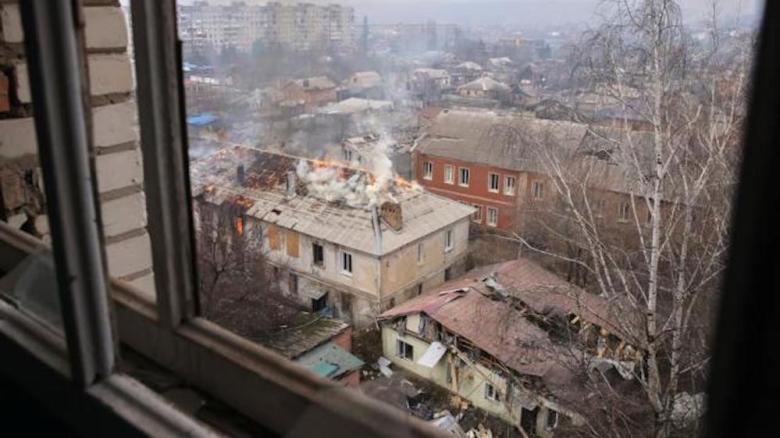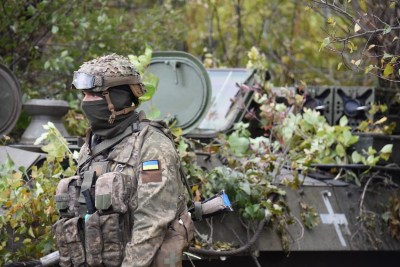There’s a notion floating around the Internet that the current conflict in Ukraine is going to remain a static war of attrition that will bleed the Russian army dry. So what if it decimates Ukraine’s society and eradicates most of its population? At least the dreaded Russian war machine will have been ground to a halt in the killing fields of Ukraine.
Those believing this narrative are living in a fantasy.
Fact is, the Ukrainian military is drained, the Western supply chains are strained, and the NATO stockpiles of critical weapons and ammunition are depleted. The war is transitioning, therefore, into a conflict in which the Russian side will enjoy several critical advantages.
For those under the impression that the attritional warfare will lead to a negotiated settlement: Fat chance!
Moscow is now totally all-in on this conflict. The window of opportunity to have gotten a settlement is closed. Unless Russia loses significantly soon (which it does not appear to be in danger of, if the Battle of Bakhmut is any indication), the Russians’ numerical superiority over Ukraine’s force structure alone will ensure that they achieve the victory they’ve been waiting for.
The outcome of this war, a defeat for Ukraine and its NATO backers, was totally avoidable. Sensing the weakness of the West – and the fact that they’re woefully overextended – the Russians are going to use all means to break Ukraine and subdue it. The beginning of the end is likely happening right now in Bakhmut, a city in Ukraine’s far east (closest to the Russian border).
Russian forces have spent months implementing an encirclement of the city. At the start of February, Ukraine’s embattled President Volodymyr Zelensky had insisted that his military would fight to the bitter end in Bakhmut.
Yet such heroic declarations from Kiev must have fallen on deaf ears in the field, as reports are now circulating that the Ukrainian defenders are increasingly strained. Further, Ukrainian Defense Ministry officials have repeatedly said over the last few weeks that they will pull forces from Bakhmut if they believe the situation is getting untenable.

At the start of March, the Russian plan of bleeding the Ukrainians in Bakhmut dry appears to be working. So Ukraine is necessarily withdrawing its forces from the besieged city (which according to Ukrainian officials has been leveled after months of fighting there).
Of course, Bakhmut alone is unimportant for either side. What is important about the eastern Ukrainian village is that it lies on the path to the Dnieper River. A beating heart of trade and transportation, the Dnieper is a main artery for Ukraine.
It is a geo-strategic chokepoint within Ukraine as well. For several months, fighting has occurred between Ukrainian and Russian elements battling for control of the Dnieper River islands.
Thus far, the Ukrainians have been unable to dislodge the Russian forces in the area. Should Bakhmut be pacified, as it seems it is about to be, with the weakening Ukrainian defenders being pushed back farther from the east, the real concern in the West must be for the fate of the Dnieper.
The Russians’ strategy of attrition is working and their ultimate goal is, at the very least, to hold on to the eastern Russian-speaking portions of Ukraine as well as Crimea in the south.
Pushing Ukraine’s forces out of Bakhmut would conceivably allow Russia to race toward the Dnieper and cut the region off from the rest of Ukraine. Russian control over the Dnieper would also prevent the Ukrainians from launching an ill-advised assault on Crimea.
The slow and painful death of the Ukrainian state is at hand. Whether it happens in a few months or a year, the Russians aren’t going anywhere, and they are going to fight this war the same way they’ve fought every conflict in their history: with lots of manpower, brutality, and time.
Ukrainian side of the rout at Bakhmut
Now, some on social media have lambasted my prognostications, telling me that Bakhmut was never as strategically important as I was saying it was. But that claim doesn’t pass the smell test.
After all, if it was so unimportant, why would Ukraine even waste its limited resources and personnel holding the city for as long as it did?
It has been said the goal was to bleed Russia out. Now that the situation in Bakhmut is untenable for the Ukrainians, they are moving their defenders to a new defensive line outside of the city, hoping to draw the Russians into a new meat grinder.
This sounds an awful lot like the fantastical thinking that dominated at the end of the Third Reich in the Führerbunker (no, I am not saying the Ukrainian cause is the same as Adolf Hitler’s, calm down), where the German leadership ordered entire armies to defensive positions that existed only on the maps in the bunker.
Few German military leaders had the heart to tell their insane dictator the truth, that those units did not exist, and the situation was hopeless.
Those who disagree with my take on the situation insist that the Ukrainian bleeding out of Russian forces is working. The Russians are believed to have lost more than 3,000 troops in the past four days alone of the fighting over Bakhmut.
And yet the Russian forces still took the city and are steadily advancing toward central Ukraine. Meanwhile, the Ukrainians have lost scores of troops that they will find increasingly hard to replace.
The Russians who were killed in the fighting, on the other hand, were “criminals and conscripts” easily replaced by Moscow.
Even if the Ukrainians can kill more Russians who are less well trained than they are, numbers are numbers – and Russia’s higher numbers combined with Vladimir Putin’s apparent devotion to crushing Ukraine in the war that he started a year ago is stronger than whatever the North Atlantic Treaty Organization is doing.
Ukraine can’t kill its way out of this mess
As my colleague Daniel Davis at the defense publication 1945 wrote of the situation in Bakhmut recently:
“The [Armed Forces of Ukraine have] long understood Bakhmut would be nearly impossible to hold, and as far back as May 2022, began to prepare new lines of defense in the Slovyansk-Kramatorsk area.
“Based on the loss of Soledar in January and the number of troops Russia had committed to the capture of Bakhmut by early February, the Ukrainian leaders could have withdrawn its troops in an orderly fashion to man new positions in the Slovyansk-Kramatorsk line by early to mid-February.”
And as for the glorious, hallowed tanks that the West promised Ukraine to great fanfare, they’ve committed barely one-third of the armor that Ukraine’s military had requested. Of that promised armor, hardly any has arrived – and at least for the Americans, the vaunted Abrams main battle tank (MBT) is unlikely to materialize on the battlefield for at least another year.

Given the losses the Ukrainians have sustained fighting in the east – and will likely continue to sustain as the war slogs on – the tanks will make no difference for Ukraine’s defense when they finally do arrive.
Ukraine destroyed its own army
In Daniel Davis’ assessment, the losses that Ukraine’s military has sustained in the vain attempt to maintain control over Bakhmut has resulted in a severe reduction in Ukraine’s offensive capabilities that it is unlikely to restore any time soon (not without the introduction of Western forces, that is).
Asia Times commentator Stephen Bryen has accurately assessed that as Ukraine’s position at Bakhmut collapses in the face of the Russian offensive, Kiev is plotting an assault on Russian-controlled Crimea. Even at full capacity, the Ukrainians would have found taking this hardened, Russian-controlled region tough to take. Under present conditions, any attempt by Ukraine to attack Crimea will result in total disaster for the West.
The Russians now have time on their side. Moscow does not have to negotiate. Ukraine is on the retreat and its forces are unlikely to be able to mount an effective offensive any time soon. Should the Ukrainians push to hit Crimea now, as they seem to be doing, their attack will fail.
Even if a miracle does happen in that potential battle for Crimea and Ukraine’s forces make significant headway, the risk of nuclear reprisals from Russia will be at an all-time high.
The Russo-Ukrainian war is entering its next critical phase. It is a period in which the West must seriously reassess its commitment, as the Russians are not going to surrender or abandon their mission of crushing the Ukrainian state. While the Zelensky government could have been saved a year ago, the arrogance of Western leaders prevented a deal from moving forward.
Alas, the Western side will lose in Ukraine. It just needs to determine how badly it wants to lose. Let’s hope there are some real reassessments going on right now in the White House and in Brussels.
Otherwise, we are truly staring down a third world war that will involve nukes – and it is a war that the United States is not going to be able to win without destroying itself first, just as the European great powers did in the First World War.

